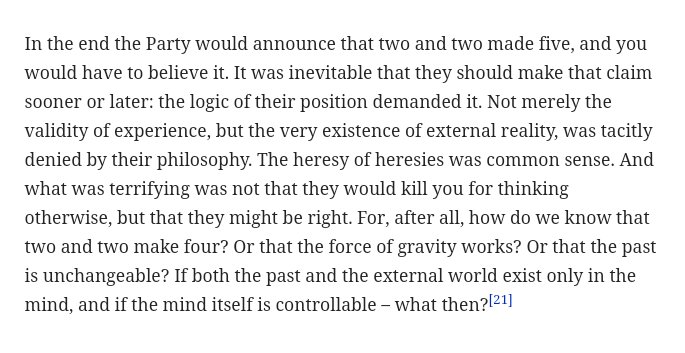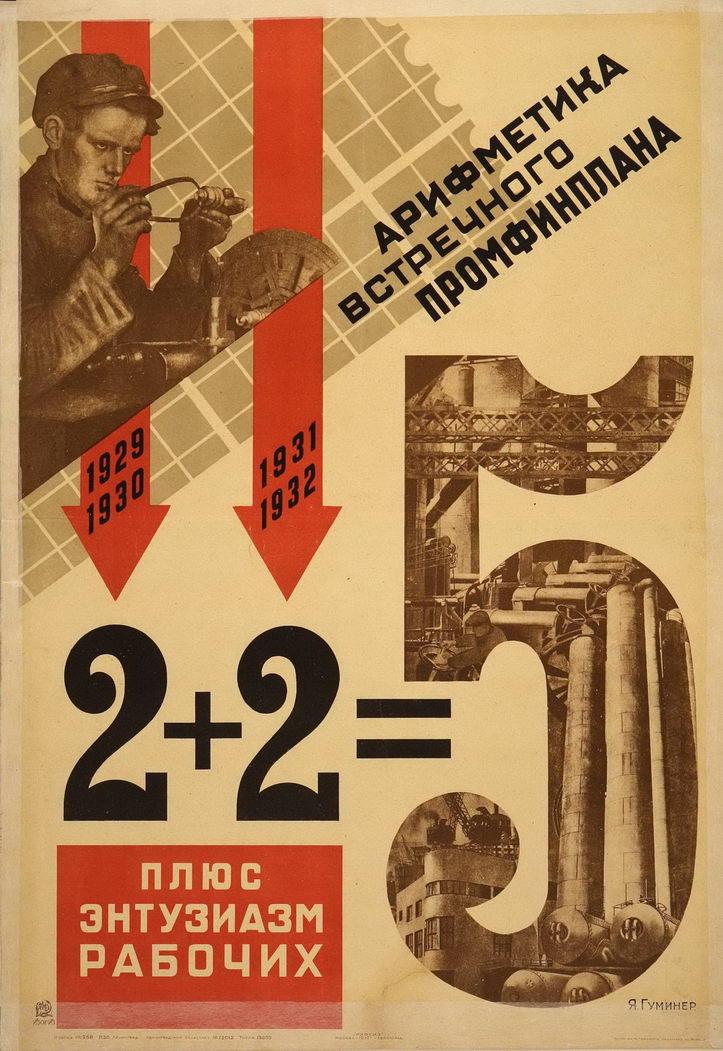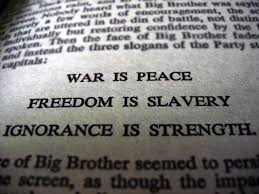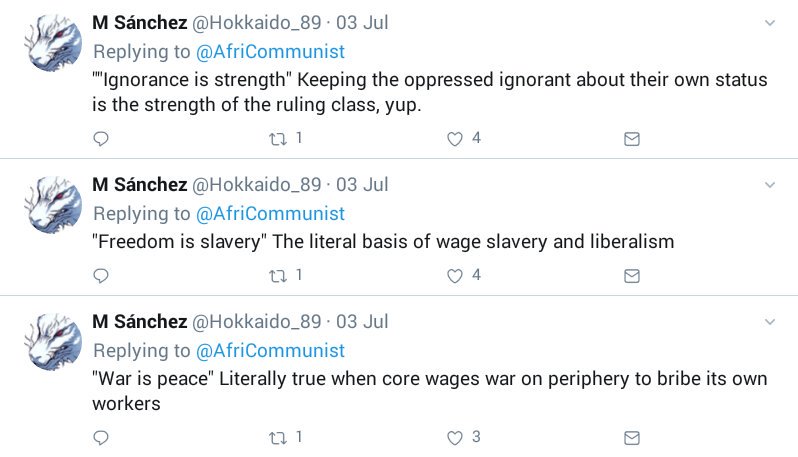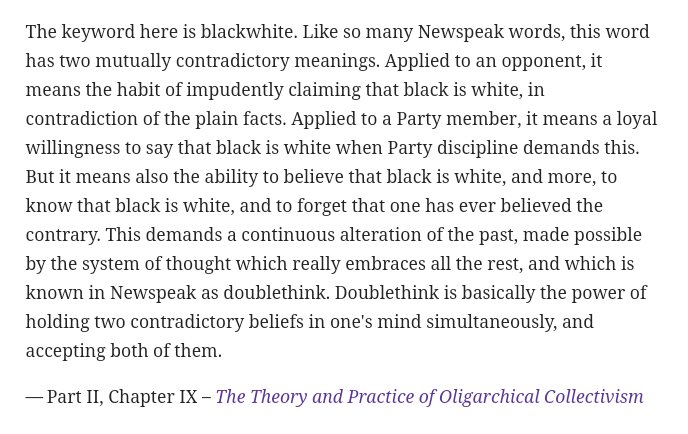The beginning of 2017 saw Orwell's anti-communist opus 1984 enjoy a partial resuscitation. Whilst we often - and rightly - attack Orwell for his dealings with the British state, it's rare that we deal with his pestilent book. https://www.theguardian.com/books/2017/jan/24/george-orwell-1984-sales-surge-kellyanne-conway-alternative-facts
The reasons for this are many. Firstly, Orwell's gargantuan is pretty badly wiritten, with both overwrought melodrama and didactic style. https://www.theguardian.com/books/2014/nov/18/nineteen-eighty-four-george-orwell-will-self-ludicrous-essential-truth
Beyond this, the politics Orwell promotes are very vague in 1984. Although its easy enough to see that his subject is "Stalinism" and the USSR, any real examination of history provides quite simple grounds for one to dispute his central claim - the notion of a "total state".
As such, the book is quite difficult to approach from the standpoint of sincere political criticism. It isn't a serious work of political fiction but a propagandist narrative, with all the paranoia that entails.
I suggest that the best way to approach Orwell's novel to examine both the context in which it occupies in the novelist's political life, and where it sits in the summation of his thought - "English socialism".
Orwell wrote the novel between 1947 and 1948. He was seriously ill with tuberculosis and living in solitude, which many critics often point to in order to explain the apocalyptic vision he produced.
In reality, it is the necessary fruition of Orwell's political and artistic life. Orwell's anti-communism was well established before even the Second World War, with the publication of Homage to Catalonia in 1936 and The Road to Wigan Pier in 1937.
Wigan Pier is one of Orwell's most revealing texts from the standpoint of class. His tone throughout is moralizing: a lament on the conditions faced by the workers he observes.
Despite this lament, Orwell nowhere offers an indication as to why the workers faced such appalling conditions. For example, when discussing the conditions faced by coal miners, Orwell nowhere mentions the mine owner's responsibility in this, nor the defeat of the General Strike.
Viewing this example in isolation, you could easily say that Orwell was simply an idiot, to whom such questions did not occur.
However, when we understand that Orwell used contacts inside the National Unemployed Workers' Movement - which was led by the Communist Party - to write his book, it becomes clear that this was not the case. He was well acquainted with the causes of what he observed.
Complementing this analysis is the tone of antagonism Orwell adopts toward the left throughout this book.
Orwell on Communist circles in London: 'You and I and the editor of the Times Lit. Supp., and the poets and the Archbishop of Canterbury and Comrade X, author of Marxism for Infants – all of us really owe the comparative decency of our lives to poor drudges underground ...’
By replacing a critique of the bourgeoisie with a critique of "let-wing hypocrisy", Orwell makes his own class alliance clear. Even if his critique of the left here were true (which it is in regard to some of his references), Orwell's sneering achieves nothing but false guilt.
Whilst the early roots to Orwell's anti-communism go back further - he was schooled at Eton, for example - it is safe to safe that it was both cemented and public between 1936 and 1937.
Significantly, in Wigan Pier we see Orwell clearly adopt an attitude that form the backbone of both his work and politics: individualist moralizing.
Another notable development in Orwell's politics prior to this period was his experience with POUM in Spain. https://twitter.com/bolshethicc/status/937640676786876417
In the lead up to 1984, Orwell's loathing for the left gained an even more sepentile character. This is very well-known by now, but it deserves mention. At the beginning of the 1940s, Orwell began to compile a list of people he suspected of beginning Communist Party members.
No-one asked him to do this btw. He wrote the list entirely under his own command.
It is in this period that Orwell began to court both Special Branch and the CIA, who appreciated his anti-communist writing. As a consequence, he workedfor the BBC Eastern Service between 1940 and 1943 and as The Observer's war correspondent in 1945.
By 1947, whilst composing 1984, Orwell's anti-communism allowed him to work directly for the British state. He assumed the role of Vice Chair of the Freedom Defence Committee, which vetted civil servants for political tendencies. The aim was to exclude communists.
Just after his most famous novel's publication, in 1949, Orwell sent a list of 38 individuals to the British Information Research Department. This body was set up to combat communist literary and cultural influence into trade unions or organisations like the BBC.
From this, broad overview, we can see that 1984 is by no means 'separate' from Orwell's politics. It was written during the height of his anti-communist activity, rather ironically when he was vice chair of a department involved in the active state repression of communist ideas.
The apocalyptic expression his novel gives is by no means due to his individual misery. It is the logical fruition of his politics over the 1940s, the work of a virulent anti-communist.
This is very important to understand when approaching 1984. The book was considered by Orwell as expressing his view on communism, which he claimed represented 'the dominant form of totalitarianism'.
This is very explicit in Orwell's own writing around the work. In the 1950s, a US theatre producer named Sidney Sheldon wrote to him, interested in adapting to book for Broadway. Orwell sold the rights to Sheldon and made sure to instruct him on the book's purpose:
This provides us with a window into the book's political construction. By describing his works's concept as 'what communism would look like [...] rooted in the English speaking countries', Orwell is admitting it is mostly based upon purely imagination.
1984 is quite literally Orwell imagining communism from his standpoint as an anti-communist. It is severed from offering a real critique because its explicit object of critique does not exist and never has existed.
In order to prevent the illusion he is attempting to weave from falling apart, Orwell decontextualises Soviet slogans, imagery and Marxist concepts through a series of motifs.
This is an attempt to paint the picture that he has drawn his illusion from a sustained critique of Marxist history and ideology. If this were true, then his work would serve as a general critique of Marxism, albeit a wrong one. It isn't.
The most obvious example of my analysis here is the slogan "2+2=5", which is used toward the end of the book. Orwell's protagonist, Winston, is captured by the state. He is asked to accept that 2+2=5 as a symbol of the Party's power.
Now, there are many uses of this formula in literary history, all of them better than this. Largely, these references stem from French and Russian literature. They have a long history - from Blazac and Victor Hugo to Dostoyevsky and Tolstoy.
Orwell isn't making reference to any of this though. He's far too busy decontextualising Soviet history. In his evocation of the formula "2+2=5", Orwell is instead making reference to a 1931 poster by the Soviet propaganda artist Iakov Guminer.
Here is the poster.
Translation: "2+2=5: Arithmetic of a counter-plan plus the enthusiasm of the workers."
Translation: "2+2=5: Arithmetic of a counter-plan plus the enthusiasm of the workers."
Aside from being quite a nice piece of design, this poster and its slogan were intended to serve a concrete purpose. In 1928, the Soviet Union began its first five year economic plan. The aim was to transform the USSR into an industrial nation.
After statistics from the first two years showed that it was ahead of schedule, Stalin announced it would be completed in four years. The poster is a play on the fact that the original plan had been to last five years, in celebration of the Soviet workers' performance.
Orwell seizes this formulation to "prove" that the logic of communist societies requires one to abandon real logic. It sits in his book as a condemnation of the abuses of power, completely decontextualised from its real use as a "well done" from a propaganda artist to the workers
This approach to communist ideas and history is seen clearly throughout 1984, most particularly in its application to doublespeak and doublethink where it combines with Orwell's literary snobbishness.
I'm not going to go into this in detail here, so I'm going to focus on the three key slogans of Orwell's fictional regime.
What these slogans mean or what the logic that arrived to them is intended to symbolise is quite hard to pinpoint. It only becomes clear when one recognises that the slogans represent real Marxist criticisms of capitalist society. @Hokkaido_89 summed this up well.
Throuh these slogans, doublespeak and doublethink, Orwell is attempting to create a pastiche of Marxist dialectics. That this is difficult to grasp is more to do with his failure to understand the idea than anything else.
Marxist dialectics maintains that all phenomena are contradictory - a unity of opposites - and that the manner in which these contradictions achieve resolution is what drives motion.
In Orwell, this meaning is shifted. Marxist dialectics are reconfigured as doublethink, as introduced by the fictional-even-in-the-novel Emmanuel Goldstein (a stand-in for Trotsky in the novel's world).
Goldstein, in a "book" within 1984 called "The Theory and Practice of Oligarchical Collectivism", describes doublethink as 'basically the power of holding two contradictory beliefs in one's mind simultaneously, and accepting both of them.'
This a crucial change. In Orwell, Marxism is reduced to "holding two contradictory beliefs simultaneously". Orwell has removed just enough detail from the Marxist method to render it a form of nonsense capable of simply believing that war and peace are the same thing.
In reality, the reasoning behind Marxism is different. If we take society to be a unity of opposites, there are two parts to the contradiction that guide its development. These are classes.
Both parts of the statements Orwell has given can be true, but only as they pertain to individual classes. Orwell's attempt to render Marxism an evil form of mind control misses this basic and crucial step in its method.
The consequence of this is that Orwell must posit that even Marxists believe Marxism is tosh. At the end of the book a second set of slogans is revealed: "The object of persecution is persecution. The object of torture is torture. The object of power is power."
This is intended to show that Marxism is simply a ruse to hide the true intent of the Party: to hold onto power.
Now, I could go on forever about how Orwell butchers up bits of communist history and theory to serve his anti-communism so I'm largely gonna end my discussion of the novel here. However, there is one thing left to cover - Orwell's "English socialism".
The important thing to remember about Orwell is that he often appears as if he is critiquing the left from a leftist position. This is something he rejoices in over the course of Wigan Pier.
In 1984, the same role is played by Winston's opinion on "the proles" - Orwell's drunk, ill-educated proletariat. In one scene, Winston remarks that 'the future belonged to the proles'. This is the only time the novel really spends on them.
For Orwell, no more detail is necessary. It is in this one remark that Orwell adopts a similar position to that seen in Wigan Pier.
Ignoring the fact that he clearly despises them, Orwell's remark on "proles" gives the impression that he knows more than us - that there is a way apart from capitalism and communism and that it is moral.
This allows him to maintain his credibility as a left wing writer whilst constructing even the most absurd communist fantasies. He is a "moral" "English socialist".
The fundamental tenants for this belief system are laid out by Orwell throughout his work. They are abstract moralism (Wigan Pier), English patriotism (England, Your England) and anti-communism (1984).
The role played by Orwell as an "oppositional writer" allows him to extol these virtues without needing to argue their real virtue.
In conclusion: Orwell was shite. Thanks for reading.

 Read on Twitter
Read on Twitter
